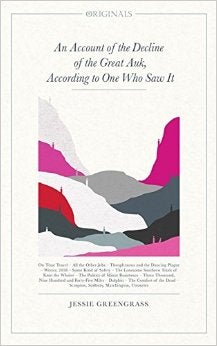An Account Of The Decline Of The Great Auk, According To One Who Saw It, by Jessie Greengrass - book review
JM ORIGINALS - £10.99

Your support helps us to tell the story
From reproductive rights to climate change to Big Tech, The Independent is on the ground when the story is developing. Whether it's investigating the financials of Elon Musk's pro-Trump PAC or producing our latest documentary, 'The A Word', which shines a light on the American women fighting for reproductive rights, we know how important it is to parse out the facts from the messaging.
At such a critical moment in US history, we need reporters on the ground. Your donation allows us to keep sending journalists to speak to both sides of the story.
The Independent is trusted by Americans across the entire political spectrum. And unlike many other quality news outlets, we choose not to lock Americans out of our reporting and analysis with paywalls. We believe quality journalism should be available to everyone, paid for by those who can afford it.
Your support makes all the difference.The stories in this impressive and unusual debut collection chronicle the lives of the lonely and the estranged. Some are set in the present such as “The Politics of Minor Resistance”, which describes with Orwellian chill the de-humanising nature of a call centre, and the little ways by which the employees reclaim their individuality. The dystopian future feels alarmingly close in “Winter, 2058”, a John Wyndham-like tale about a member of a surveillance team for mysterious “intrusions”, who feels cut off from society by the nature of the work. There are also several period pieces, including the title story, which is related by an old seaman in a matter-of-fact voice straight out of the 18th century. “We blamed the birds … we hated how they didn’t run away,” he says as he describes the sailors’ enraged massacre of the auks, whilst acknowledging sadness “because in any loss you can see a shadow of the way that you will be lost yourself”.
That a tone of philosophical melancholy hangs over Greengrass’s writing is partly due to her restrained and formal style, but partly her subject matter, too, and the way in which her protagonists are often looking back to make sense of their pasts or living in the subjunctive, in parallel worlds of wishes and dreams. The woman who feels stuck in her life in “All the Other Jobs” sustains a fantasy of alternate ways to earn a living, all of them esoteric and remote: a lighthouse keeper in Wales, a guard against polar bears in an Arctic research station. However, she has the self-knowledge to recognise that “no matter where I went I would have to take myself with me”, a truth she finds “crushing and unfixable”.
The strongest stories are the least exotic, the ones rooted in ordinary life. “Dolphin” concerns a nine-year-old girl whose neglectful father takes her on a disastrous visit to an aquarium. Greengrass, highly articulate in the language of loss and separation, skewers precisely the agonies of a child caught between warring parents. In “Three Thousand, Nine Hundred and Forty-five Miles”, a female research student endures a summer of intense loneliness after her lover enforces a separation. Falling asleep at odd times, weird imaginings; the love-craziness she sinks into without him is all too recognisable, as is the irony of the way in which she recovers. One or two of the stories are on the slight side and barely earn their keep, although the first line of one, “Sometimes I dream that there is still the internet”, is perhaps its salvation. Overall, though, this is a highly original collection from a distinctive new voice in fiction.
Rachel Hore’s A Week in Paris is published in paperback by Simon & Schuster
Join our commenting forum
Join thought-provoking conversations, follow other Independent readers and see their replies
Comments